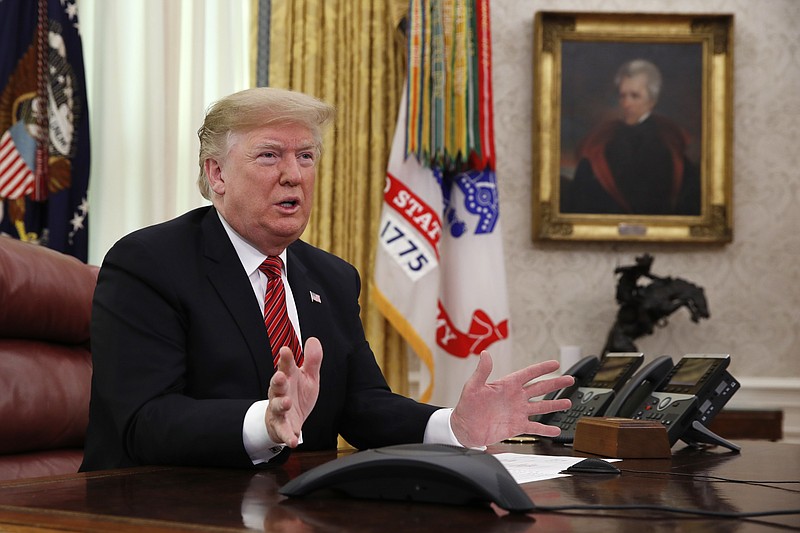Three years ago when Donald Trump ran for president, there was no need to consider what it meant to be a conservative in the Age of Trump.
The New York businessman and reality television show host was one of only 17 candidates running for the Republican nomination, and no one gave him the slightest shot of getting the nomination, much less winning the presidency.
The idea for conservatives at the time, it seemed, was rallying around the candidate with the most bona fides associated with the movement but the individual who also had the best shot at winning the general election.
Whoever won the nomination, after all, was almost certainly going to be facing Hillary Clinton, a former senator and secretary of state but certainly a controversial figure. Whoever won the nomination, except Donald Trump, it seemed at the time, would have at least an even chance of defeating her.
Then Trump dominated the party debates, making reckless statements but also populist promises and sucking support from one candidate after another. Still, no one gave him a chance at the nomination, and certainly not the general election, but he was good copy.
Ultimately, voters liked his promises, forgave his crassness and appreciated his swagger in opposition to a biased national media, something they'd never seen before but always longed for from a Republican candidate.
In time, Trump was the last one standing but was given no chance against the flawed but still formidable Clinton. Until Election Day, when the unexpected happened.
In considering the New Yorker for the nomination, we initially rejected his candidacy because no one was sure how much of a Republican he was (having previously said he was a Democrat), because of his previous support of abortion rights, because of his overzealous criticism of the George W. Bush administration over its handling of the Iraq/Afghanistan wars and because he was downright rude when there was no reason to be.
Nevertheless, when Trump became the nominee against the far-too-flawed Clinton, we had planned to give him our backing. But his lewd comments on the 2004 "Access Hollywood" tapes caused us to change our mind, and we made no endorsement - except Republicans, generally - in the general election.
Then he won, and here we are more than two years later.
Late last week, the Washington Examiner published the opinions of nine conservatives on what it means to be a conservative in the Age of Trump.
For us, it means walking a line between positive accomplishments and policy positions (tax cuts, regulation cuts, unleashed military against the Islamic State, desire for border security, conservative Supreme Court nominees, promotion of religious liberty, etc.) against negatives such as increased deficits (which eventually slow economic growth), tariffs generally, and a continued antagonistic relationship with Democrats and Republicans alike (and anyone who's not all-in with him).
To the other conservatives, it means, among other things, seeing past "Trump's manners and tweets to political reality and to the dangers and opportunities before us" (Larry Arnn, president of Hillsdale College); determining if "everything you used to believe" - such as character, truthfulness and anti-divisiveness - is as relevant as positive policy issues (David French of National Review); sticking to constitutionalism and "first principles about securing the blessings of liberty" even "if it has to completely upset the existing political order" (Mollie Hemingway of The Federalist); and being careful not to make a person or a politician "the center of our lives" or create a "government so vast that each election becomes an existential struggle" (Alexandra DeSanctis of National Review).
Others felt it means determining "every day whether to ignore, condone or even outright justify the actions of" Trump (and considering how "non-left politics" will look after Trump) (David Frum of The Atlantic); seeing "the glass at least half-full" because Trump might have been the only hope the party had (Henry Olsen of the Ethics and Public Policy Center); focusing on things like "communities and ordered liberty" that have "worked for the neighbors we're called to love" (Sen. Ben Sasse, R-Nebraska); and sustaining the "love of country" - a task the writer apparently felt was beyond Trump - and keeping it lovely (W. James Antle III of The American Conservative).
We find ourselves hewing most closely to the opinion of Atlanta radio host and The Resurgent editor Erick Erickson, whose syndicated commentaries often appear on this page. He said a conservative in the Age of Trump must balance "the friendships and jealousies of friends who embrace the president against those who disdain the president, while all supposedly working on common ground."
Such a conservative, who must elevate "the individual over the state" and restrain "the petty vanities of the collective self whether in the form of the state or the mob," could be "the most skilled diplomat in our society," he said.
We hope such men and women will rise to the fore in the next two years.
